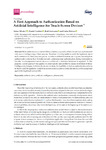A First Approach to Authentication Based on Artificial Intelligence for Touch-Screen Devices

Use this link to cite
http://hdl.handle.net/2183/26439Collections
- Investigación (FIC) [1685]
Metadata
Show full item recordTitle
A First Approach to Authentication Based on Artificial Intelligence for Touch-Screen DevicesDate
2020-08-18Citation
Silvelo, A.; Garabato, D.; Santoveña, R.; Dafonte, C. A First Approach to Authentication Based on Artificial Intelligence for Touch-Screen Devices. Proceedings 2020, 54, 1. https://doi.org/10.3390/proceedings2020054001
Abstract
[Abstract]
Most authentication schemes follow a classical approach, where the users are authenticated only once at the beginning of their sessions. Therefore, it is not possible to verify the legitimate use of such a session or to detect any usurpation. In order to address this issue, we propose a second-phase authentication scheme that provides not only continuous user authentication during their sessions, but also in a transparent manner, since no additional or intrusive hardware is required. To this purpose, a novel approach was applied to create specific user profiles by means of different Artificial Intelligence techniques. In this work, we aim to study the feasibility of such an authentication scheme, so that it could be applied to a real time environment in order to verify the identity of the actual user against the legitimate user profile.
Keywords
Authentication
Artificial intelligence
Cybersecurity
Artificial intelligence
Cybersecurity
Description
Presented at the 3rd XoveTIC Conference, A Coruña, Spain, 8–9 October 2020
Editor version
Rights
Atribución 4.0 Internacional
ISSN
2504-3900






